As a certified holistic nutritionist and longtime athlete who relies on protein powders almost daily, I understand the importance of finding the perfect low-carb protein powder to support your health and fitness goals. That’s why we’ve tested and reviewed dozens of the best protein powders to bring you the top six low carb protein powders on the market.
Our evaluation process covered various factors such as ingredient quality, nutritional content, taste, mixability, and overall value, ensuring only the best options made our final list. We narrowed down our selection by leveraging our expertise and real-world experience. Whether you’re looking to support muscle growth, manage your weight, or simply find a tasty, high-quality protein supplement, our top picks offer something for everyone. Read on to discover the best low carb protein powder that suits your needs.
Editor’s choice: Transparent Labs Whey Protein Isolate
Our editor’s choice for the best whey protein isolate is Transparent Labs Whey Protein Isolate. After testing numerous products, this one stood out for its exceptional quality and clean ingredients. You can read our full review below.
Medical disclaimer: This article is intended for educational and informational purposes only. It is not intended as a substitute for medical advice. For health advice, contact a licensed healthcare provider.
Our picks for the best low carb protein powder
- Best high protein: Transparent Labs Whey Protein Isolate
- Best tasting: Sports Research Whey Protein
- Best whey: Legion Athletics Whey+
- Best for weight loss: Nutricost Grass Fed Whey Isolate Unflavored
- Best low sugar: Gainful Whey Based Build Muscle Protein
- Best vegan:Promix Nutrition Unflavored Vegan Protein Powder
How to choose the best low carb protein powder for you
Choosing the best low carb protein powder involves considering several key factors to ensure it meets your nutritional needs, dietary preferences, and health goals. Here are some steps to help you make an informed decision:
Check the protein source
Common sources include whey, casein, soy, pea, and other plant-based proteins. Whey protein isolate is a popular choice for low carb diets due to its high protein content and low lactose levels. For those who are vegan or lactose intolerant, pea protein or other plant-based options can be suitable alternatives.
Examine the nutritional profile
Look at the nutritional information to ensure the protein powder aligns with your dietary goals. This includes checking the amount of protein, carbohydrates, fats, and total calories per serving. Ideally, a low carb protein powder should have fewer than 5 grams of carbs per serving while providing a high amount of protein, typically around 20-25 grams.
Consider ingredient quality
Opt for protein powders with high-quality ingredients and minimal additives. Avoid products with artificial sweeteners, flavors, or preservatives if you prefer a cleaner supplement. Instead, look for those sweetened with natural alternatives like stevia or monk fruit.
Check for additional nutrients
Some protein powders are fortified with additional nutrients like vitamins, minerals, and amino acids. For instance, BCAAs added to plant-based protein powders can be beneficial for muscle recovery and growth, especially when 2–3g of leucine are added. Vitamin D and other essential nutrients can also add value to the supplement.
Evaluate flavor and mixability
Taste and texture matter, especially if you plan to consume the protein powder regularly. Read reviews to find out how well the powder mixes with liquids and if the flavor is pleasant. Some products come in multiple flavors or even unflavored options, giving you flexibility based on your taste preferences.
Look for third-party testing
To ensure the product’s safety and quality, check if it has been third-party tested for contaminants and banned substances. Certifications from organizations like Informed-Choice or NSF International provide an added layer of assurance regarding the product’s purity and efficacy.
Consider cost and value
Compare the price per serving to determine if the protein powder offers good value for money. Sometimes, higher-priced products come with added benefits like better ingredient quality or additional nutrients. Evaluate whether the cost aligns with the benefits provided.
Compare low carb protein powders
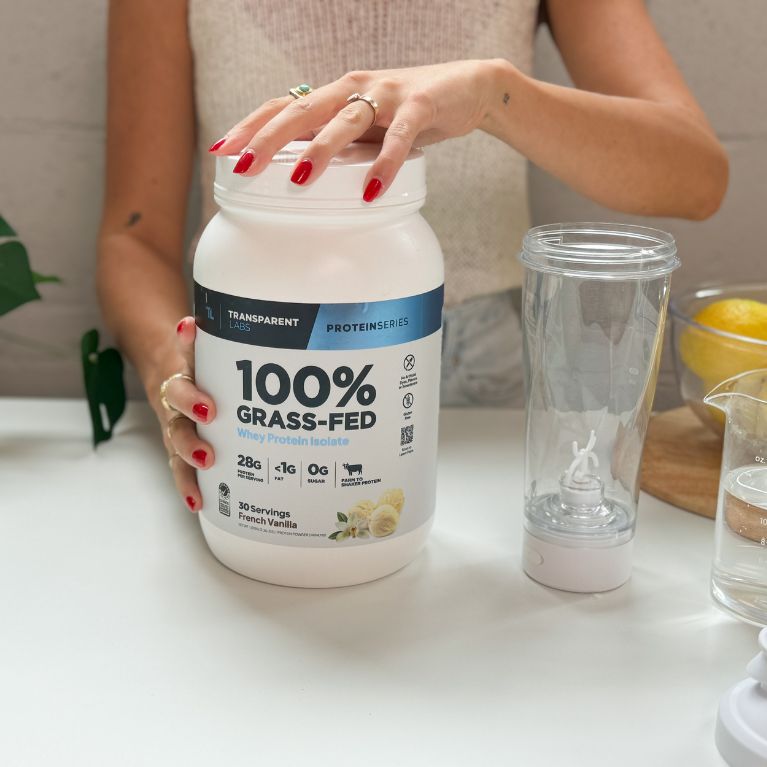
|
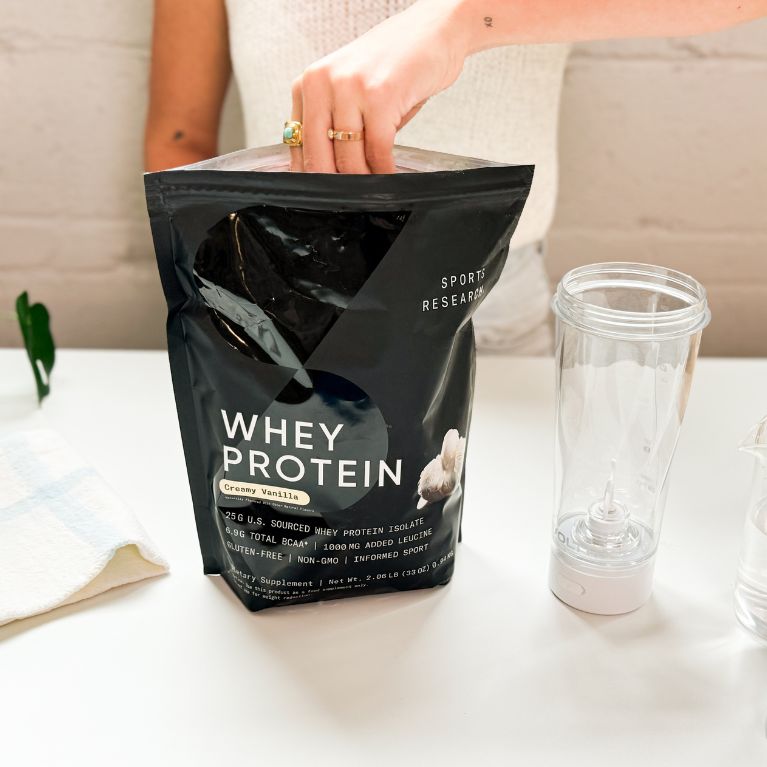
|
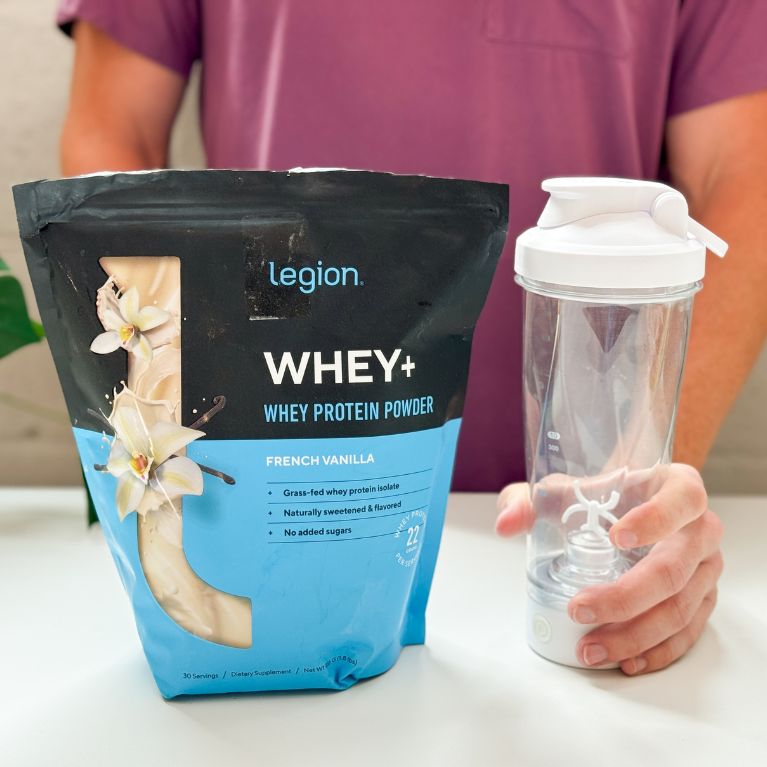
|
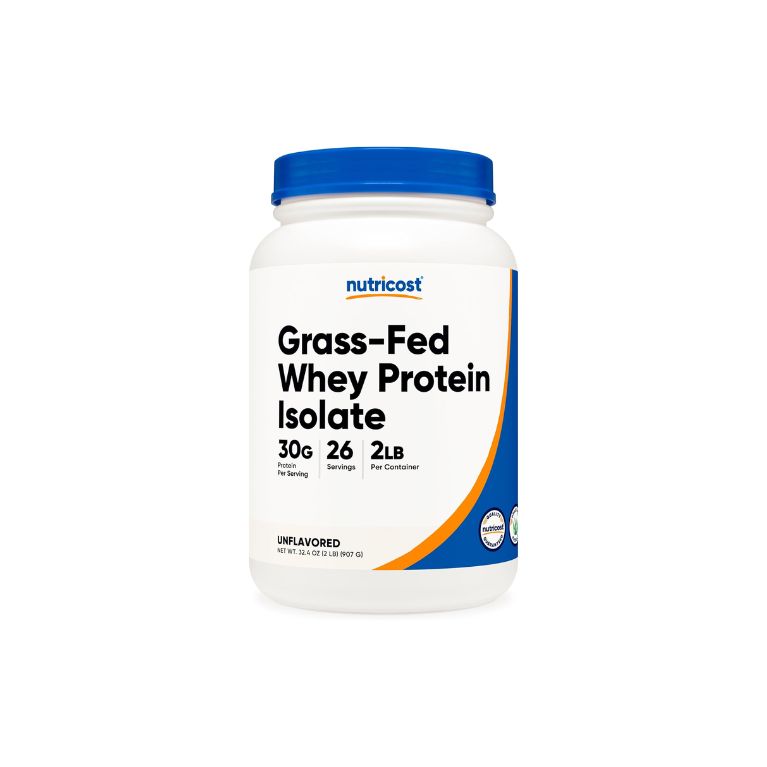
|
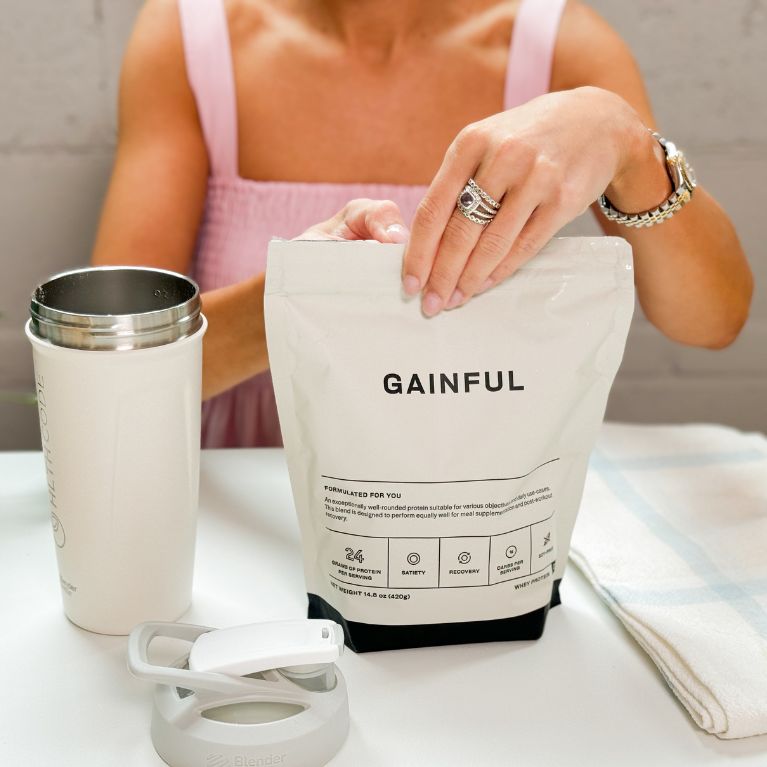
|
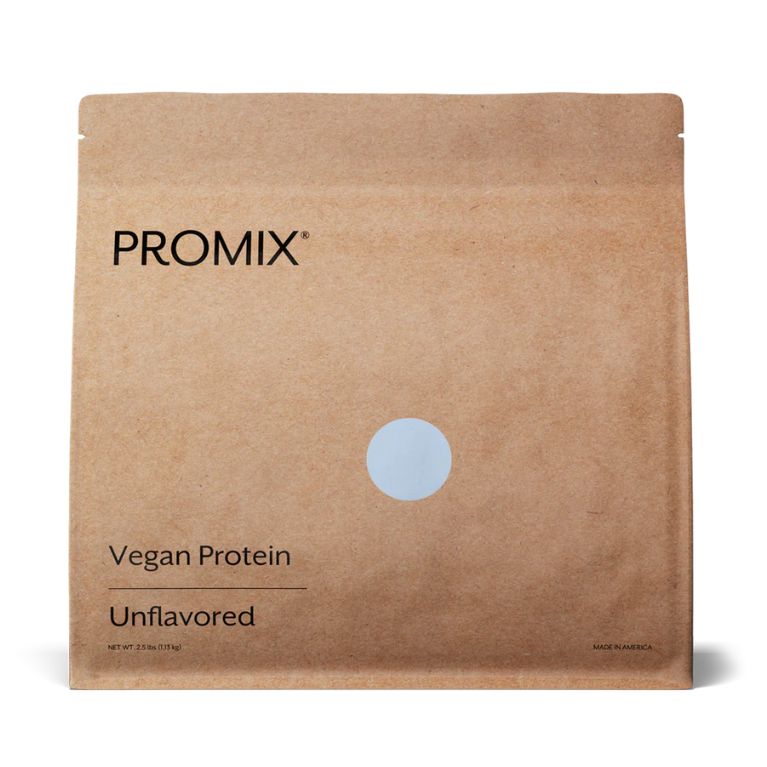
|
|
| Transparent Labs Whey Protein Isolate | Sports Research Whey Protein | Legion Athletics Whey+ | Nutricost Whey Isolate Unflavored | Gainful Whey Based Build Muscle Protein | Promix Nutrition Unflavored Vegan Protein Powder | |
| Rating | ||||||
| Cost per serving | $2 | $1.46-$1.52 | $2 | $2.15 | $3.21 | $1.16 |
| Servings per container | 30 | 25-26 | 30 | 26 | 14 | 38 |
| Protein type | Whey protein isolate | Whey protein isolate | Whey protein isolate | Whey protein isolate | Whey protein concentrate, whey protein isolate, micellar casein | Organic pea protein isolate |
| Flavor options | 11 + unflavored | 2 | 15 + unflavored | 2+ unflavored | 8 + unflavored | Unflavored |
Best low carb high protein powder: Transparent Labs Whey Protein Isolate
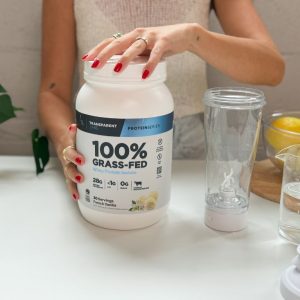

Key product features
What you should know
Transparent Labs Whey Protein Isolate stands out for its clean ingredient profile, using grass-fed whey and stevia for sweetness. It’s third-party tested for purity, ensuring you get a high-quality product free from harmful additives.
- One of our product testers said this is one of the best protein powders he’s ever had. While it left him feeling full, he didn’t experience any bloating or digestive issues.
- At $60 per container, this protein powder is just shy of $2 per serving. While this is on the higher end for protein powders, we think the cost is justified.
- With 28 grams of protein per serving, Transparent Labs Whey Protein Isolate is ideal for muscle growth and recovery.
Best tasting low carb protein powder: Sports Research Whey Protein
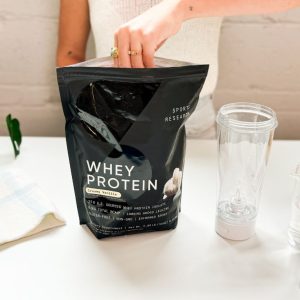

Key product features
What you should know
Sports Research Whey Protein features a low-carb, low-sugar formulation enriched with MCT powder and vitamin D, offering additional health benefits. It is gluten-free and non-GMO, catering to a range of dietary preferences.
- Sports Research Whey Protein contains 25 grams of protein and 3850 mg of leucine per serving, which is important for muscle protein synthesis.
- Priced at $1.46 to $1.52 per serving, depending on the flavor you choose, this protein powder is slightly above the average market price.
- Because Sports Research Whey Protein is third-party tested through Informed Sport, it’s a safe supplement for athletes to use.
Best low carb whey protein powder: Legion Athletics Whey+
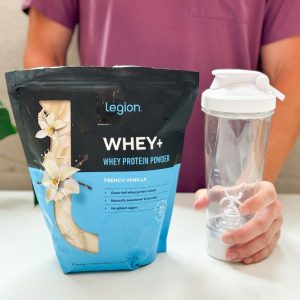

Key product features
What you should know
Legion Whey+ offers a clean, naturally sweetened protein powder with excellent mixability in a wide variety of flavors. Each serving contains 21 to 23 grams of protein and less than 1 gram of sugar.
- Taste-wise, one of our product testers gave the Dutch chocolate flavor a 5 out of 5 and the cinnamon cereal a 4.5 out of 5.
- At just under $2 per serving, Legion Whey+ is priced higher than average for a protein powder.
- Legion Athletics Whey+ is ideal for health-conscious individuals and gym goers who prioritize high-quality, grass-fed whey protein powder.
Best low carb protein powder for weight loss: Nutricost Grass Fed Whey Protein Isolate Unflavored
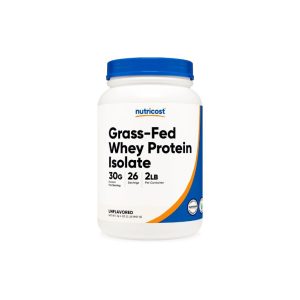

Key product features
What you should know
Nutricost Grass-Fed Whey features 30 grams of whey protein isolate per serving, providing fast absorption and aiding muscle recovery. The unflavored option contains no added sugars, perfect for those looking for a purer choice.
- This product combines whey protein isolates with unflower lecithin, an emulsifier that helps the protein mix better with liquids.
- This protein powder starts at $1.67 per serving on Amazon, which is an average price for a whey protein powder.
- Its low calorie and fat content, combined with whey protein isolate for fast absorption, make Nutricost Whey Isolate an excellent choice for those aiming to lose weight while preserving muscle mass.
Best low carb low sugar protein powder: Gainful Whey Based Build Muscle Protein
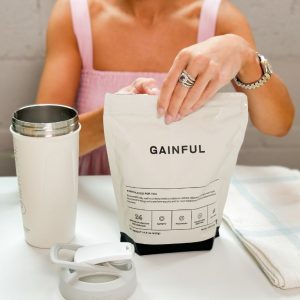

Key product features
What you should know
This protein powder is a blend of whey protein concentrate, whey protein isolate, and micellar casein. Each serving provides 24 grams of protein and less than 1 gram of total sugar in just 110 calories.
- Gainful offers a fully customizable protein powder, from the type of protein used, to the amount of protein included, and flavor-enhancing boosters. For the purpose of this review, we chose the whey base and muscle building goal customizations.
- Gainful Whey Based Build Muscle Protein is much higher than the average market price at $3.21 per serving for a 14-day package.
- This protein powder is best for individuals looking for a customizable protein supplement tailored to their specific dietary needs and fitness goals, particularly those focused on muscle building with a low-carb, low-sugar profile.
Best low carb vegan protein powder: Promix Nutrition Unflavored Vegan Protein Powder
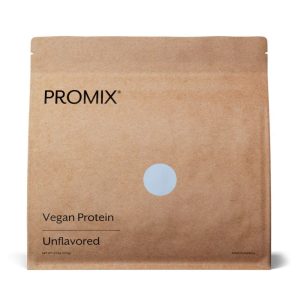

Key product features
What you should know
Promix Nutrition Unflavored Vegan Protein Powder offers a clean, allergen-free option with 115 calories and 2 grams of carbs per serving. It is non-GMO, gluten-free, and provides a balanced nutritional profile.
- Each serving contains 25 grams of vegan protein (delivering 5.2 grams of BCAAs) and fortified with 200% of the daily value for vitamin B12, which is particularly helpful for vegans.
- At $1.15 per serving, Promix Nutrition Unflavored Vegan Protein Powder is priced below average for a pea protein powder.
- This protein powder features organic Canadian yellow pea protein isolate and added vitamin B12, making it an excellent choice for those seeking a nutritious, allergen-free protein supplement that supports vegan dietary needs.
How we score the best low carb protein powders
Finding the right supplement that meets health goals and delivers on promised claims requires time and research. On top of that, you need to consider product safety and price.
Dedicated to helping you find the best protein powder for muscle gain, we do the leg work for you. Our team tested, evaluated, and fact-checked over 100 protein powders on the market, taking many key factors into consideration, including effectiveness, quality, safety, and price, looking for supplements that rank high in several key areas to create our list of recommendations. Learn more about our whey protein powder scoring methodology and plant-based protein powder methodology here.
We used the following criteria to score each protein powder:
Efficacy—40%
Efficacy means the effectiveness of the product in achieving its claims and the evidence that supports those claims. Each supplement can help consumers achieve specific health benefits. We examine whether a supplement delivers on its promised benefits.
Here’s what we look for:
- Clinical evidence
- Calories per serving
- Dose
- Mixability
Safety and side effects—35%
When choosing a supplement, you have to assess health risks, adverse effects, and safety profiles. We ensure the safety of these products through first-hand testing. To do this, we evaluate:
- Reported side effects
- Current research
- Third-party testing
- Manufacturer accreditation
- Artificial sweeteners
- Added ingredients like caffeine
Value—20%
We know that value doesn’t just mean price—it also includes the quality you get for the price. Our team factors in a cost analysis to determine the true worth of a supplement in relation to its price. We then identify products that offer a solid return on investment:
Our factors in this rating include:
- Price per serving
- Quality standards
- Heavy metal testing
Customer experience—5%
A customer’s experience with a company directly impacts satisfaction, loyalty, and the likelihood of repeat purchases. That’s why our team includes it in our testing process.
Our factors in this rating include:
- Ease of purchase
- Shipping and returns
- Customer support
- Subscription service
- 100% satisfaction guarantee
- Multiple forms
What is low carb protein powder?
Low carb protein powder is a dietary supplement designed to provide a high amount of protein while minimizing carbohydrate content. These powders are ideal for individuals following low-carb diets, such as ketogenic or Atkins diets, where reducing carbohydrate intake is a priority to promote fat loss and maintain muscle mass. Low carb protein powders typically contain fewer than 5 grams of carbohydrates per serving, making them suitable for those looking to limit their carb intake without sacrificing protein consumption.
Benefits of low carb protein powder
Low carb protein powder offers several benefits, particularly for individuals following a low-carb or ketogenic diet. One of the primary advantages is its ability to support muscle growth and recovery without significantly impacting carbohydrate intake. (1) By providing a high protein content and minimal carbs, these powders help maintain muscle mass and promote repair after workouts, which is essential for athletes and those engaged in regular physical activity. (2)
Another benefit is weight management. Low carb protein powders can help with weight loss by reducing hunger and increasing satiety. Protein is known to be more filling than carbohydrates and fats, which can help control appetite and reduce overall calorie intake. This can be particularly beneficial for those looking to lose weight or manage their weight effectively. (15)
Other low carb protein powders we tried
While curating our list of the best low carb protein powders, we came across several products that, despite their potential, didn’t quite make the cut for our top recommendations. Here’s why:
- Isopure Infusions Protein Powder: Isopure Infusions offers a refreshing twist with its clear, fruit-infused flavors like Pineapple Orange Banana. It’s a pleasant change from your typical protein shake, but it does come with a trade-off—each serving only has 20 grams of protein. It’s refreshing and tastes great but might not meet the needs of those aiming to maximize their daily protein intake.
- Organifi Complete Protein: Organifi’s Complete Protein is a great plant-based option that includes a full profile of essential vitamins and minerals. However, it tends to have a higher carb count, 10 grams per scoop, due to the veggie blends. Plus, at $80 a tub, it’s on the pricier side. It’s a versatile and nutrient-rich choice, but it might not fit everyone’s low-carb or budget requirements.
- Myprotein Impact Whey Isolate: Myprotein Impact Whey Isolate boasts an impressive 25 grams of protein per serving with just one gram of carbs, making it a strong contender. However, some feedback pointed to its taste and mixability as less than ideal. Our testers noted a slightly chalky texture that didn’t dissolve as well as other top brands, which could be a drawback for those who prioritize smoothness and flavor in their shakes.
Each of these products has its strengths, but they didn’t fully align with our criteria for the best low carb protein powders based on our specific testing standards and user feedback.
FAQs
Which protein powder has the lowest carbs?
Typically, whey protein isolates or hydrolyzed whey protein isolates will contain the lowest amount of carbohydrates. Protein powders from Transparent Labs, Jacked Factory, and Gainful contain as little as 0–1 grams of carbs per serving. Always check the nutritional label for specific carb content.
Are low carb protein shakes good for you?
Yes, low carb protein shakes can be good for you, especially if you are following a low-carb or ketogenic diet. They can provide a high amount of protein, which supports muscle maintenance, growth, and recovery, while keeping carb intake low. Additionally, low-carb protein shakes can help with weight management by reducing hunger and increasing satiety. However, it’s important to choose a protein shake with high-quality ingredients and minimal additives. Always consult with a healthcare provider to ensure it fits your dietary needs and health goals.
What is the best protein powder to use on a keto diet?
The best protein powder to use on a keto diet is one that is high in protein and low in carbohydrates. Whey protein isolate is a popular choice. Look for protein powders that provide at least 25 grams of protein and less than 5 grams of carbohydrates per serving. Additionally, protein powders containing MCT oil benefit those on a keto diet since they can provide a quick energy source. This makes keto-friendly protein powders with MCT oil an ideal choice for those looking to boost their energy levels while adhering to a keto diet.
Is it good to take a low carb protein powder every day?
Yes, it’s okay to use low carb protein powder every day, especially if it aligns with your dietary goals and nutritional needs. Daily use can help you meet your protein requirements, support muscle growth and recovery, and aid in weight management by promoting satiety. However, it’s important to choose a high-quality protein powder with minimal additives and consult with a healthcare provider to ensure it fits your overall diet and health plan.
These statements have not been evaluated by the Food and Drug Administration. These products are not intended to diagnose, treat, cure, or prevent any diseases.
Our experts
Robert Wildman, Ph.D., RD, LD, CISSN, FISSN
“Dr. Rob” is a globally renowned exercise, fitness, and nutrition expert who speaks around the world on exercise and sport nutrition, and continues to work with professional and elite athletes to achieve their highest level of performance as well as health and fitness. Rob received his Ph.D. from The Ohio State University, earned his MS from Florida State University, and earned his BS from the University of Pittsburgh. He is also a registered and licensed dietitian.
Victoria Burgess, Ph.D., CSCS, CISSN
Victoria uses her extensive nutrition and performance knowledge every day. She has a Ph.D. in Health and Human Performance from Concordia University Chicago and holds her NSCA CSCS and Certified Sports Nutritionist (CISSN). She’s an adjunct professor in the Human Performance and Nutrition department at Concordia University Chicago and Parker University, where she teaches undergraduate, graduate, and doctoral-level courses. She also sits on the advisory board for both the International Society of Sports Nutrition and the National Advisory Council of the First Responder Institute.
Jessica Coulon
Jessica is a contributing editor and writer for Fortune Recommends who specializes in fitness, health, nutrition, and science content. Previously, she was an editor for Popular Mechanics and Bicycling, where she covered pro cycling news, wrote how-to guides, and tested all the latest and greatest bike gear. She was also a regular shoe tester and contributor for Runner’s World. You can often find her skiing or riding her mountain bike, and racing with the F1RE female enduro team.
Joana Neziri, M.S., NASM CPT
Joana is a writer, editor, and content strategist focusing on nutrition, fitness, and all things health. After earning a master’s degree in business from the University of North Florida, she began a career in research and digital marketing.
Kelly Uhler
Kelly has a multifaceted background in elder care, health care, and copywriting. She has worked for organizations such as A Place For Mom and Homecare.com, which gave her the opportunity to work closely with families, providing reliable information to help them make informed decisions about their loved one’s health, safety, and quality of life.

Melissa Boufounos, CHN
Fortune Recommends Nutrition Writer
About Author
Melissa Boufounos is a certified holistic nutritionist, nutrition writer, and lifelong athlete in the greater Ottawa, Ontario, Canada area. She specializes in sports nutrition and works with teen hockey players and competitive obstacle course race athletes in her virtual private practice MB Performance Nutrition .
Sources
- Arentson-Lantz, E. J., & Kilroe, S. (2021). Practical applications of whey protein in supporting skeletal muscle maintenance, recovery, and reconditioning. Journal of animal science, 99(4), skab060. https://doi.org/10.1093/jas/skab060
- Zaromskyte, G., Prokopidis, K., Ioannidis, T., Tipton, K. D., & Witard, O. C. (2021). Evaluating the Leucine Trigger Hypothesis to Explain the Post-prandial Regulation of Muscle Protein Synthesis in Young and Older Adults: A Systematic Review. Frontiers in Nutrition, 8, 685165. https://doi.org/10.3389/fnut.2021.685165
- Jadhav, H. B., & Annapure, U. S. (2023). Triglycerides of medium-chain fatty acids: a concise review. Journal of food science and technology, 60(8), 2143–2152. https://doi.org/10.1007/s13197-022-05499-w
- Segheto, K. J., Pereira, M., Silva, D. C. G. D., Carvalho, C. J., Massardi, F. R., Kakehasi, A. M., Juvanhol, L. L., & Longo, G. Z. (2021). Vitamin D and bone health in adults: a systematic review and meta-analysis. Ciencia & saude coletiva, 26(8), 3221–3244. https://doi.org/10.1590/1413-81232021268.15012020
- Ao, T., Kikuta, J., & Ishii, M. (2021). The Effects of Vitamin D on Immune System and Inflammatory Diseases. Biomolecules, 11(11), 1624. https://doi.org/10.3390/biom11111624
- Duarte, N. M., Cruz, A. L., Silva, D. C., & Cruz, G. M. (2020). Intake of whey isolate supplement and muscle mass gains in young healthy adults when combined with resistance training: a blinded randomized clinical trial (pilot study). The Journal of sports medicine and physical fitness, 60(1), 75–84. https://doi.org/10.23736/S0022-4707.19.09741-X
- A Castro, L. H., S de Araújo, F. H., M Olimpio, M. Y., B de B Primo, R., T Pereira, T., F Lopes, L. A., B S de M Trindade, E., Fernandes, R., & A Oesterreich, S. (2019). Comparative Meta-Analysis of the Effect of Concentrated, Hydrolyzed, and Isolated Whey Protein Supplementation on Body Composition of Physical Activity Practitioners. Nutrients, 11(9), 2047. https://doi.org/10.3390/nu11092047
- Church, D. D., Hirsch, K. R., Park, S., Kim, I. Y., Gwin, J. A., Pasiakos, S. M., Wolfe, R. R., & Ferrando, A. A. (2020). Essential Amino Acids and Protein Synthesis: Insights into Maximizing the Muscle and Whole-Body Response to Feeding. Nutrients, 12(12), 3717. https://doi.org/10.3390/nu12123717
- Kim J. (2020). Pre-sleep casein protein ingestion: new paradigm in post-exercise recovery nutrition. Physical activity and nutrition, 24(2), 6–10. https://doi.org/10.20463/pan.2020.0009
- Banaszek, A., Townsend, J. R., Bender, D., Vantrease, W. C., Marshall, A. C., & Johnson, K. D. (2019). The Effects of Whey vs. Pea Protein on Physical Adaptations Following 8-Weeks of High-Intensity Functional Training (HIFT): A Pilot Study. Sports (Basel, Switzerland), 7(1), 12. https://doi.org/10.3390/sports7010012
- Fernandes, S., Oliveira, L., Pereira, A., Costa, M. D. C., Raposo, A., Saraiva, A., & Magalhães, B. (2024). Exploring Vitamin B12 Supplementation in the Vegan Population: A Scoping Review of the Evidence. Nutrients, 16(10), 1442. https://doi.org/10.3390/nu16101442
- de Carvalho, K. M. B., Pizato, N., Botelho, P. B., Dutra, E. S., & Gonçalves, V. S. S. (2020). Dietary protein and appetite sensations in individuals with overweight and obesity: a systematic review. European journal of nutrition, 59(6), 2317–2332. https://doi.org/10.1007/s00394-020-02321-1
